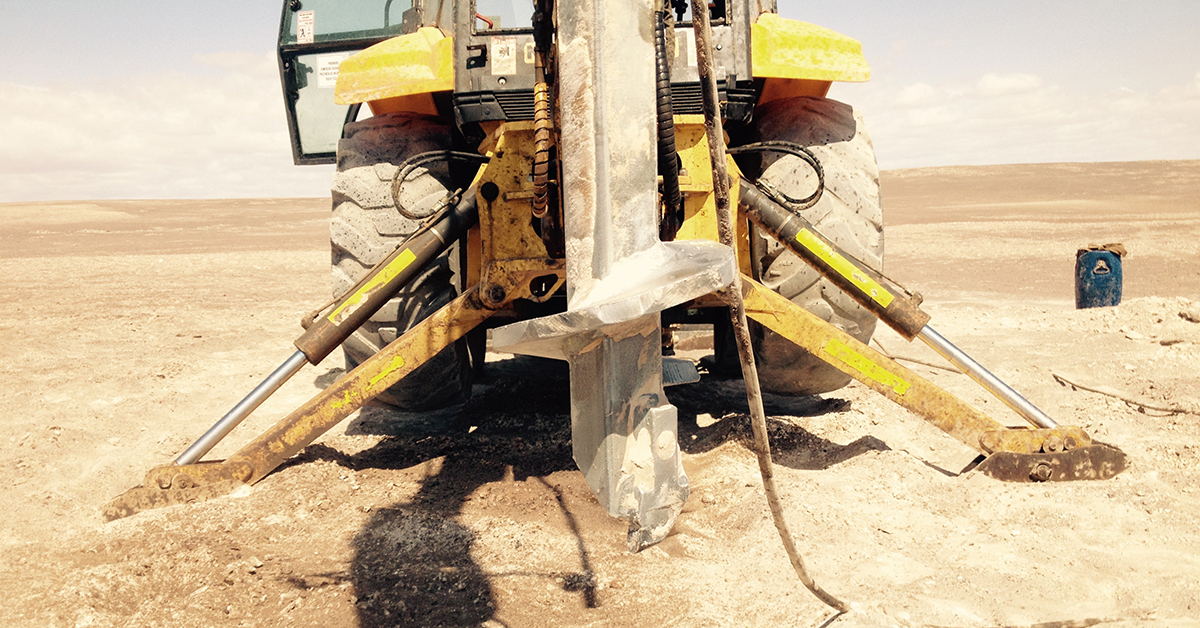Whether you are trying to build in the dense rock of Charleston, West Virginia or Denver, Colorado or if you are encountering permafrost in Alaska or Canada, you have probably encountered tougher-than-most soil conditions, making it nearly impossible to lay the deep foundation that would give your building project the best start.
Dense, rocky, high blow count, and permafrost soils can pose problems when installing a standard helical pile, a tested, proven, and widely accepted deep foundation solution. Installers were finding that some conditions required pre-drilling a pilot hole in order to complete a job. Unexpected obstructions were also known to slow down installation, and Chance® engineers, the leaders in helical pile technology, worked to find a solution.
Their research led them to the solution of a welded carbide tip designed to break through even the toughest conditions. To be sure, they field tested the design in the caliche soil, which has a natural cement-like consistency, of the Atacama Desert of Chile.

Testing ROCK-IT
 A backhoe was brought in to test the hardness of the soil, but the operator was only able to dig a shallow hole, a little over a foot deep in the caliche, before abandoning the effort.
A backhoe was brought in to test the hardness of the soil, but the operator was only able to dig a shallow hole, a little over a foot deep in the caliche, before abandoning the effort.
The standard, square shaft helical pile also failed to penetrate the caliche. Finally, after these two (anticipated) failures, the ROCK-IT 3-helix (6-8-10) square shaft pile was ready to be tested. The ROCK-IT lead section successfully penetrated the extremely dense, rock-like topsoil. Additionally, it was backed out and the same pile was able to be reinstalled in multiple locations throughout the testing.
Installation Advantages
It was no accident that engineers chose a square shaft helical pile as the base for the ROCK-IT helical pile design. Unlike round shaft, also known as pipe shaft, the square shaft pile is made from low-alloy, high-strength, solid steel. Due to their low displacement shaft and higher helix-to-shaft diameter ratio, solid square shaft is better for tough soil conditions than larger displacement piles of comparable capacity.
The carbide tip reduces spiking of torque and chatter during installation for better pile performance and safer installation.

Proving ROCK-IT
Since the initial, successful field testing the ROCK-IT lead section has been used and proven in helical pile applications around the world. According to Tim Ashenbrenner of Dynamic Helical, Inc., a Chance distributor in Homer, Alaska, “The ROCK-IT lead sections have allowed us to use helical foundations where we would otherwise not be able to due to permafrost conditions. This product is able to effectively penetrate through the frozen soil to significant depths without the need to predrill a pilot hole which is costly and time consuming.”
Another installation team, this one in Texas, uses ROCK-IT to get past shallow limestone layers. Having the option of the carbide tip allows helical piles to be a versatile solution in any type of soil condition.
Learn more about how ROCK-IT can save you time and money in the toughest soil conditions.
Ready for a quote? Contact your local distributor!

